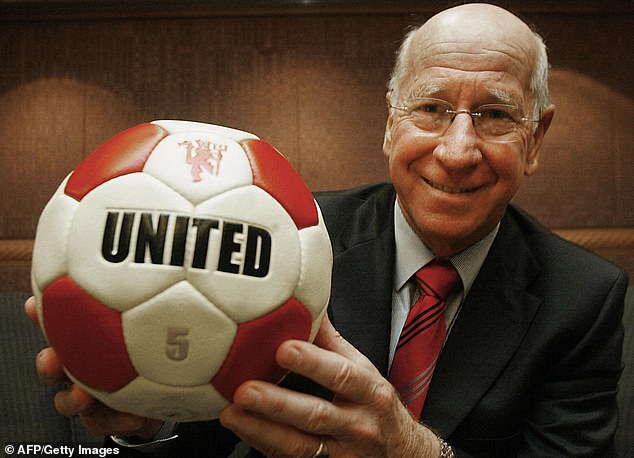A blow to the head during sports DOES NOT cause brain damage – as long as you don’t play professionally, study finds





A new study finds that sports-related concussions do not increase your risk of permanent brain damage, unless you play a professional sport.
British researchers found that head injuries while playing football or rugby not only do not increase the risk of cognitive decline in old age, but even have a protective effect.
Contact sports are controversial because of the link between dementia and other brain diseases in players, which are thought to be the result of frequent blows to the head.
The most famous is the former English footballer Sir Bobby Charlton who died of dementia in 2023 at the age of 86.

Sir Bobby Charlton (pictured holding a ball emblazoned with the words United during an interview with local press at a Hong Kong hotel in 2005) died of dementia in 2023 at the age of 86
Former England and West Bromwich Albion striker Jeff Astle has died at the age of 59 after an early illness, reportedly caused by repeated head injuries.
Former rugby player Steve Thompson was also diagnosed with early-onset dementia at the age of 43.
A 2023 study commissioned by the English Football Association and the Professional Football Association found that professional footballers are three times more likely to be diagnosed with dementia than the general population.
But the latest research suggests amateur players may not suffer the same fate.
The study is the largest to date examining the long-term cognitive effects of sports-related concussions.
Researchers from the University of South Wales found that people who suffered a concussion while playing a sport during their lifetime had slightly better cognitive performance than people who reported not having suffered a concussion.
The research, published in the Journal of Neurology, Neurosurgery and Psychiatry, analyzed data from more than 15,000 participants in a British study of brain aging among 50- to 90-year-olds.
Researchers collected data on lifetime concussions from 15,214 participants using the Brain Injury Screening Questionnaire.
Of these, 6227 (39.5 percent) reported at least one concussion and 510 (3.2 percent) at least one moderate to severe concussion.

Former rugby player Steve Thompson was also diagnosed with early-onset dementia at the age of 43

The former hooker revealed in 2022 that he could no longer remember winning the World Cup
On average, participants reported having sustained their last head injury 29 years before the study and their first head injury 39 years before the study.
Cognitive function was compared between those who had suffered zero, one, two, or more than three concussions during sports and those who had suffered zero, one, two, or more than three non-sports-related concussions.
The sports-related concussion group showed a 4.5 percent improvement in working memory compared to the non-concussion group, and reasoning ability also increased by 7.9 percent.
People who had suffered a single concussion as a result of sports had better verbal reasoning and better attention than people who had not suffered a concussion.
Participants with more than three non-sport-related concussions, such as accidents and assault, had poorer processing speed and attention, and declining verbal reasoning ability with age.

A coroner ruled that Jeff Astle had died in 2002 from an “occupational disease”, but it was claimed that former England and West Bromwich Albion striker Jeff Astle died at the age of 59 as a result of repeated head injuries.
‘This study shows that sports can provide long-term benefits that outweigh the negative effects of concussions. This may have important implications for policy decisions around participation in contact sports.
“It is also possible that non-sports-related head injuries may lead to greater brain damage than sports-related concussions,” said lead author Professor Vanessa Raymont, from the University of Oxford and Oxford Health NHS Foundation Trust.
She added that the study had some limitations, such as the fact that the older participants could remember details of events from more than 30 years ago, which may have influenced the reporting of head injuries.
While most studies focus on the effects of concussions in younger athletes in the period immediately following the head injury, this study examines the effects on middle-aged to older adults following a concussion.
Dr Matt Lennon MD, PhD, a researcher at UNSW Medicine and Health’s Centre for Healthy Brain Ageing (CHeBA) and lead author of the study, says the results show that exercise has long-term cognitive benefits.
He said: ‘While these results do not indicate whether a particular sport is safe, they do indicate that exercise in general may have a more beneficial effect on long-term cognitive health than the harm it causes, even in people who have suffered a concussion.’
“This finding should not be overstated: the beneficial effects were small and in people who had suffered two or more sports-related concussions, there was no longer any benefit from the concussion,” he added.
However, he stressed that this research does not apply to concussions in professional athletes, where head injuries are more common, more disabling, and more severe.
Anne Corbett, Professor at the University of Exeter and lead investigator of the PROTECT study, said: ‘What we are seeing is a completely different profile of brain health in people who have suffered a concussion as a result of sport, compared with people who have not suffered a concussion.
‘Concussions that occur during sports do not lead to brain health problems, while other types of concussions do, especially if people sustain multiple concussions.
“People who participate in sports actually appear to have better brain health, regardless of whether or not they sustained a concussion during sports.”




